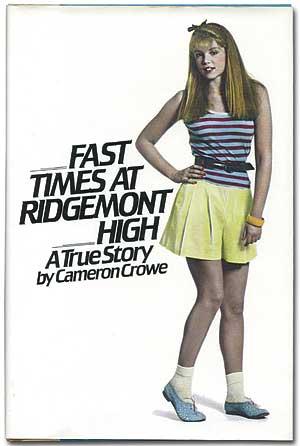Too many people have no idea that Fast Times at Ridgemont High was a book before it was a movie. Those who have read it largely agree that it's even better than the famous film, yet the book is currently out print. If you haven't been exposed to it, you've truly missed out on one of the most authentic high school stories ever told.
The Book
Cameron Crowe is a talented writer who got an early start (the film Almost Famous is loosely based on his life). While working for Rolling Stone, Crowe went undercover at a high school while in his early twenties in order to research Fast Times at Ridgemont High. He attended for an entire school year, and a very memorable book and movie were the result.
The book itself very closely resembles the movie, but the story has much more depth. Linda and other characters become less shallow on the page, and there's much more dialogue and interaction. Since it's out of print, you'll have a hard time finding a copy (it's not available digitally). But you can watch the film to get a sense of the story.
The Film
Fast Times tracks a key group of high school students through one year. At the center of the story is Stacy Hamilton, a sophomore who has spent the summer working at a hip burger joint in the mall. She's friendly with Linda, who is a senior. Brad Hamilton, Stacy's older brother, is also a senior and he's pretty much got it made. He's got a great job, a cool car and a steady girl. He's the opposite of Rat, the shy movie usher who works across the mall from Stacy's summer gig. He has a huge crush on her, and under the coaching of his too-cool-for-school friend Damone, asks her out on a date.
Stacy is being coached through High School dating by Linda, who is purportedly very knowledgeable about sex. With her encouragement, Stacy makes a date with a much older guy. She lies to him about her age, sneaks out of the house, and the two have sex on their date. He sends her flowers the next day, which she asks her brother Brad to get rid of. He does so by giving them to Lisa, whom he's planning to dump so he can date other girls.
Stacy uses her newfound sexual confidence to put the moves on Rat during their date, but it freaks him out. She ends up putting the moves on Damone instead, and he's happy to comply. But when he doesn't help Stacy deal with the resulting pregnancy, Linda steps up to get revenge. Rat confronts him, too, and we see that Damone isn't the totally cool guy he pretends to be.
Brad isn't the totally cool guy he thinks he is, either. He loses his job after blowing up at a customer and decides to hang onto his girl, but she doesn't want to hang onto him. He eventually gets a job at a convenience store and, with help from school stoner Jeff Spicoli he becomes a hero.
Jeff is the best character in the film. Played by Sean Penn, Spicoli is that perpetually-stoned slacker who exists in every high school. But he meets his match in the form of Mr. Hand, the school's toughest and sternest teacher.
Stacy learns that Linda isn't really so experienced, and things immediately get better when she stops taking her advice.
What Got Adapted?
The film is more streamlined than the novel, the stories around each character more neatly arranged. On film, distinct main characters emerge, while the book is a bit more scattered and unfocused. And some things did get lost or changed in translation. In the book, Stacy is much more aggressive with her older date. They go on more than one date, and finally she puts the moves on him to get him to make love to her. It happens in one date on film, and he is the aggressor. In the book, he continues to ask her for dates until she reveals her true age to him.
Spicoli isn't nearly so likable in the book, though some of this is no doubt due to Sean Penn. He makes Spicoli one of the bright spots of the film, but on the page he's more of a buffoon. Many of Penn's memorable film lines aren't even in the original book. Forest Whitaker's character is much more developed on the page; he appears only very briefly in the movie. One fairly prominent character from book, Steve, was deleted from the film entirely.
Search for a copy of the book if you will, but you'll have much better luck finding the now-iconic film. If you've seen it, see it again with new appreciation. If you haven't seen it, what are you doing? Go watch it right now.















